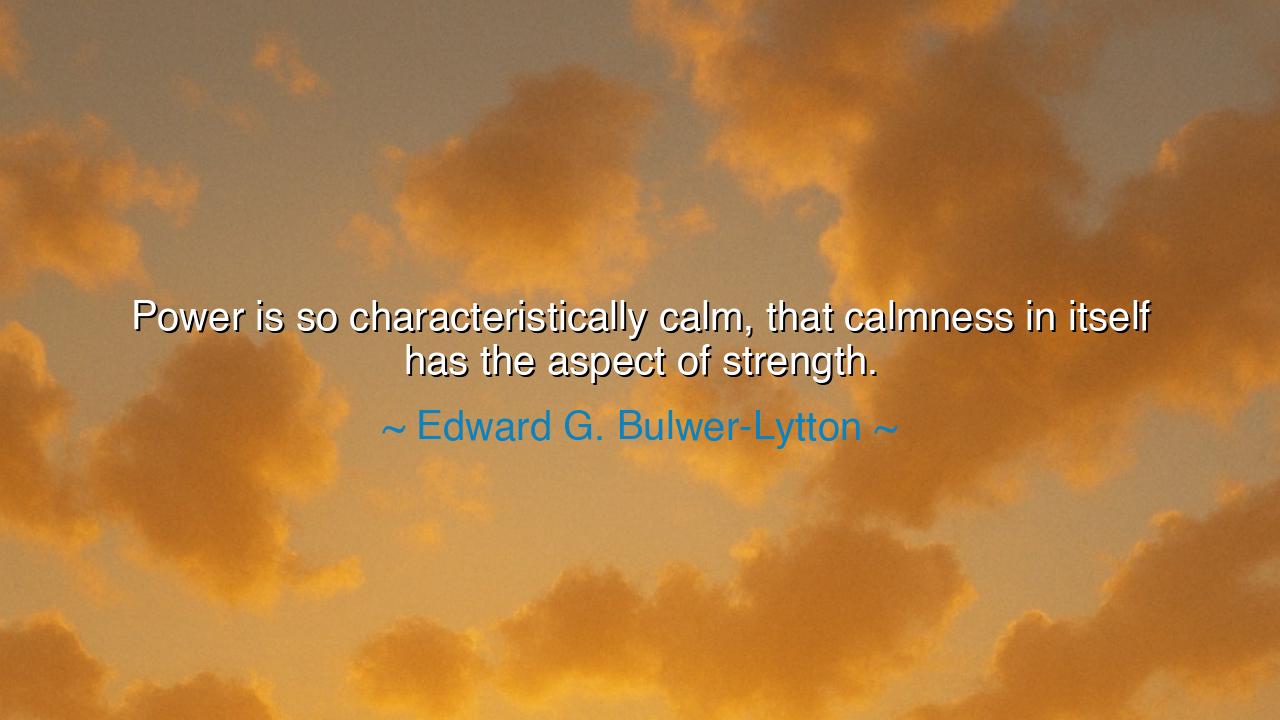
Power is so characteristically calm, that calmness in itself has
Power is so characteristically calm, that calmness in itself has the aspect of strength.






Hear the words of Edward G. Bulwer-Lytton, poet and statesman, who declared with penetrating vision: “Power is so characteristically calm, that calmness in itself has the aspect of strength.” In this simple yet profound sentence, he unveils the hidden nature of true authority. For power need not shout, nor rage, nor tremble—it is secure within itself. Calmness is its garment, composure its crown. When the spirit is steady as still waters, others recognize in it the mark of unshakable strength.
The origin of this saying lies in Bulwer-Lytton’s reflections on politics, literature, and human conduct in the nineteenth century. He lived in a world of upheaval, where nations shifted and voices clamored for dominance. Yet he perceived that the leaders who endured, the ones whose authority was respected, were not those who thundered with empty passion, but those who remained calm, measured, and steadfast. For agitation betrays insecurity, but calmness signals command. Thus he wrote that power and calmness are woven together, each giving shape to the other.
History itself bears witness to this truth. Consider George Washington, standing before his weary troops at the darkest hour of the American Revolution. His men were restless, some ready to mutiny, yet Washington did not shout nor threaten. He spoke calmly, and when he placed spectacles upon his nose, remarking on his years of service and failing sight, his quiet dignity broke their rebellion and restored their loyalty. It was not force of arms, but the serene composure of his presence that revealed his power. Calmness, in him, was strength itself.
Contrast this with those rulers who mistake fury for might. Caligula of Rome raged with endless cruelty, believing his terror to be power. Yet his violence betrayed weakness, and he fell to the daggers of those who no longer feared his madness. His was the noise of desperation, not the calmness of strength. From such examples we learn: power that is secure does not need to shout, for its presence is enough.
The heart of Bulwer-Lytton’s wisdom is that calmness itself is a kind of language of authority. When one is calm, even amidst chaos, others are drawn to follow. Calmness steadies the fearful, reassures the uncertain, and rebukes the reckless. It carries the silent weight of conviction, showing that a person does not need to be hurried or inflamed, for they are master of themselves—and he who rules himself may rule others.
This teaching speaks also to our daily struggles. Many believe that to show power is to argue louder, to impose their will with force, to dominate with haste. Yet often the greatest strength lies in quiet composure: in listening rather than shouting, in patience rather than panic, in steady endurance rather than hurried reaction. Calmness is the shield of the strong, the cloak of the wise, the fortress of the enduring.
The lesson for us is clear: cultivate calmness as a sign of true strength. In moments of trial, breathe deeply and remain steady. In disputes, do not let fury consume you, for rage clouds judgment and betrays insecurity. In leadership, show composure, for others will find courage in your calm. Practice stillness in your heart, and you will discover that calmness itself commands respect, for it reflects power that is sure of itself and unmoved by storms.
Thus, O seeker, remember Bulwer-Lytton’s words: power is characteristically calm. Let calmness dwell in you, for it is not weakness but the very aspect of strength. As the ocean is vast though it seems still, as the mountain is mighty though it does not move, so too the calm spirit is powerful beyond measure. This is the strength that endures, the strength that inspires, the strength that transforms tumult into peace.






AAdministratorAdministrator
Welcome, honored guests. Please leave a comment, we will respond soon